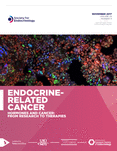The role of the inflammatory microenvironment in thyroid carcinogenesis
- Laboratory of Cancer Molecular Genetics, Faculty of Medical Sciences, University of Campinas (FCM-Unicamp), Rua Tessália Vieira de Camargo 126, Barão Geraldo, Campinas, São Paulo, Brazil
- Correspondence should be addressed to L S Ward; Email: ward{at}fcm.unicamp.br
Abstract
Immune responses against thyroid carcinomas have long been demonstrated and associations between inflammatory microenvironment and thyroid carcinomas repeatedly reported. This scenario has prompted scientists throughout the world to unveil how the inflammatory microenvironment is established in thyroid tumors and what is its influence on the outcome of patients with thyroid carcinoma. Many studies have reported the role of evasion from the immune system in tumor progression and reinforced the weakness of the innate immune response toward thyroid cancer spread in advanced stages. Translational studies have provided evidence that an increased density of tumor-associated macrophages in poorly differentiated thyroid carcinoma (DTC) is associated with an aggressive phenotype at diagnosis and decreased cancer-related survival, whereas well-DTC microenvironment enriched with macrophages is correlated with improved disease-free survival. It is possible that these different results are related to different microenvironments. Several studies have provided evidence that patients whose tumors are not infiltrated by lymphocytes present a high recurrence rate, suggesting that the presence of lymphocytes in the tumor microenvironment may favor the prognosis of patients with thyroid carcinoma. However, the effect of lymphocytes and other immune cells on patient outcome seems to result from complex interactions between the tumor and immune system, and the molecular pattern of cytokines and chemokines helps to explain the involvement of the immune system in thyroid tumor progression. The inflammatory microenvironment may help to characterize aggressive tumors and to identify patients who would benefit from a more invasive approach, probably sparing the vast majority of patients with an indolent disease from unnecessary procedures.
- thyroid carcinomas
- inflammatory microenvironment
- tumor-infiltrating lymphocytes
- tumor-associated macrophages
- Revision received 15 November 2013
- Accepted 3 December 2013
- Made available online as an Accepted Preprint 3 December 2013
- © 2014 Society for Endocrinology












